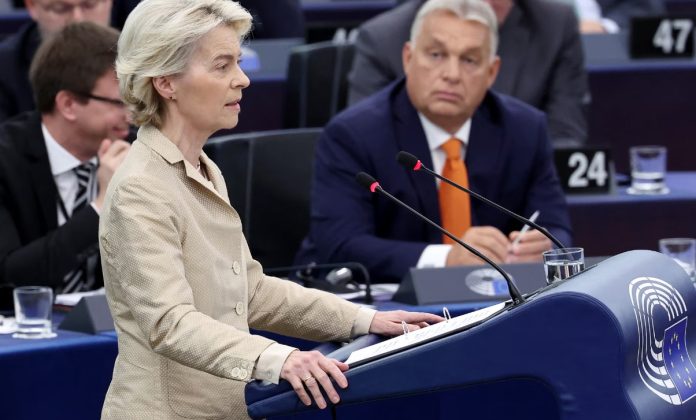Hungarian Prime Minister Viktor Orbán on Wednesday presented his country’s EU Council presidency priorities to the renewed European Parliament. The routine session turned into a fierce debate: European Commission head Ursula von der Leyen got into an argument with Orbán and once again accused the Hungarian PM of violating European interests and a pro-Russian stance.
The European Parliament discussed with Prime Minister Viktor Orbán on Wednesday Hungary’s priorities for its six-month presidency of the EU Council, which began on July 1.
MEPs belonging to centrist forces tried several times to interrupt Orbán’s speech, booing his statements about the consequences of illegal migration and the need to resolve the conflict in Ukraine through dialogue with Russia. Orban ended his presentation with the slogan “Make Europe Great Again,” which almost echoes the slogan of US presidential candidate Donald Trump during the 2016 campaign. Supporters of the Hungarian PM applauded after his speech.
Orbán said the EU needs change. One reason, according to Orbán, is that the EU’s economic growth over the past two decades has been much lower than that of China and the US, and the EU’s share of world trade has also declined. Pointing to energy prices as a key obstacle, Orbán said that “the EU has lost significant GDP growth as a result of abandoning Russian energy sources.”
Responding to Hungarian PM, European Commission President Ursula von der Leyen outlined three key priorities for the EU, including Ukraine. She criticised Hungary’s stance on Russia, lamenting that “one member state in particular” was still trying to buy fossil fuels from Russia despite the EU’s commitment to be energy independent. Von der Leyen said:
The world has witnessed the atrocities of Russia’s war. And yet, there are still some who blame this war not on the invader but on the invaded. Not on Putin’s lust for power but on Ukraine’s thirst for freedom. So I want to ask them: Would they ever blame the Hungarians for the Soviet invasion of 1956?…We Europeans may have different histories and different languages, but there is no European language in which peace is synonymous with surrender. And sovereignty is synonymous with occupation.
Most speakers in parliament criticised the Hungarian PM for his performance since taking over the presidency and for his co-operation with Moscow and Beijing.
Last autumn, Russian President Vladimir Putin admitted that the USSR made a mistake when it introduced tanks into Hungary in 1956 and Czechoslovakia in 1968. He said:
You cannot do anything in the sphere of foreign policy that goes in clear contradiction with the interests of other nations.
Hungarian authorities welcomed the remarks. Earlier, Orbán said:
I am criticised that I am a friend of Putin, but I’m friend of the Hungarians for a second. I’m friend of the peace.
